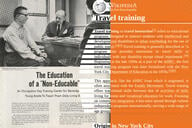You have /5 articles left.
Sign up for a free account or log in.
Librarians at dozens of colleges have been scrambling to reorganize their subscriptions to academic journals after a company that manages subscriptions abruptly filed for bankruptcy this fall.
The Netherlands-based company Swets Information Services B.V. declared bankruptcy in September in Amsterdam. The company’s North American branch filed for Chapter 7 bankruptcy in New Jersey at the end of November.
That means recent orders and payments made to Swets from libraries may not reach publishers, who will likely lose money, and libraries that had money tied up in Swets accounts likely will see only part of it returned, possibly without the subscriptions they paid for.
Swets' bankruptcy filing lists more than 100 colleges among its creditors. That number doesn’t include large state systems with multiple contracts among their campuses, such as the State University of New York and California State University. Several Canadian colleges are also listed among the creditors.
About 20 of the largest research libraries in the U.S. were significantly affected by the company’s failure, said Ann Campion Riley, president-elect of the Association of Research and College Libraries.
Riley is the Associate Director for Access, Collections and Technical Services at the University of Missouri at Columbia libraries, which has a claim amount of $1,051,224, according to the filing.
Local news reports about the University of Colorado at Boulder and Utah State University said legal teams at both universities are working to recover as much of the $3 million and $2 million, respectively, that they paid to Swets.
Virginia Commonwealth University said in a statement that its lawyers are working with outside counsel to decide how to proceed. The university has $1,467,240 at stake.
Other universities with more than a million dollars in claims, according to the filing, include Michigan State University, the University of Southern California, the University of Missouri at St. Louis, Massachusetts Institute of Technology and Washington University in St. Louis. Many other colleges have claims ranging from a few hundred dollars to a few thousand.
Some publishers have announced they’ll honor subscriptions even if they haven’t received a payment from Swets, Riley said. Otherwise, libraries will have to call publishers and ask for payment plans or a grace period of a few months.
That’s no small task, either. Large university libraries could have between 20,000 and 40,000 journal subscriptions. One large publisher may oversee a couple thousand journals, but for a library operation the size of the University of Missouri at Columbia’s, the staff is looking at calls to probably 800 different publishers, Riley said.
The timing of the bankruptcy in the journal subscription renewal cycle fell just as libraries were paying their fall invoices for a Jan. 1 subscription start date, Riley said.
Her library still has a few weeks of work ahead to contact all the publishers with whom it has subscriptions. She’s optimistic that there won’t be any gap in access to journals, but other colleges and universities -- particularly those that can’t get additional money to pay publishers -- will likely see at least a short pause.
Swets was a big player in the world of subscription agents. The company was well-established and had a reputation as a solid serials vendor, Riley said.
The company claimed just over $4 million in assets and nearly $98 million in liabilities in its bankruptcy filing.
Swets 2013 annual report said the company failed to meet its requirements for long-term financing and closed fiscal year 2013 with a net loss of 51.1 million euros ($61.9 million), according to Library Journal. (The Swets website, where the annual report was posted, doesn’t appear to work any longer.)
Part of the explanation for Swets' failure is likely an overall shift in the market as the cost structure of publishing has changed, Riley said. After the influx of digital journals, there are fewer dollars flowing through vendors, because publishers can manage those themselves.
The bankruptcy should force libraries to be more cautious depositing money with vendors, said Kevin Smith, director of the Office of Copyright and Scholarly Communications at Duke University libraries and a blogger about library issues.
Some libraries will lose money they paid to Swets that was owed in invoices. Others, though, likely were in the habit of sending in large deposits to the company in anticipation of placing orders in the future, Smith said.
Smith understands why libraries feel the need to do that, since they could lose unspent money if they close out the fiscal year with a surplus. But it’s risky, and as unsecured creditors, libraries are at the back of the line for repayment, he said.
Smith thinks the ultimate solution is requiring a system in which money deposited with a vendor is secured in a type of escrow account. He wrote about the suggestion in a blog post for Library Journal.
This isn’t the first time libraries could be on the hook for hundreds of thousands of dollars because of a third-party bankruptcy.
In 2003, RoseCom and its Faxon Library Services filed bankruptcy. Initial loss estimates for U.S. libraries ranged from $30 million to $80 million, although publishers, who granted access without being paid, ended up taking the biggest hit.
A few years later, after all the court proceedings were settled, the library Smith worked for at the time received about 30 cents on the dollar of what it had paid to the company.
Even for those colleges that didn’t have money tied up in the company when it declared bankruptcy, the fall of Swets is still a game-changer, Smith said. Any college that used Swets to manage its journal subscriptions will have to place orders directly with publishers or switch to a new agent. That means that the largest companies, such as EBSCO Information Services, will get larger, putting more influence over scholarly publishing in the hands of fewer companies, he said.




